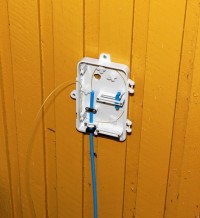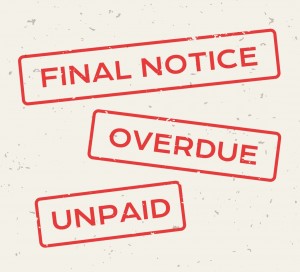Energy Complaints Scheme (ECS)
-

Victor used two 45kg LPG bottles to supply gas to his home, and they were periodically replaced by his gas retailer Gas Solutions. Gas Solutions had delivered the bottles for several years, until a new delivery driver decided it was unsafe to deliver to the property.
Gas Solutions told Victor the steep driveway, steps, and uneven ground at his property made it unsafe to deliver the 45kg bottles to his home. Victor disagreed and proposed an alternative delivery location on the property. Gas Solutions refused to change its decision, saying the new option raised the same safety issues.
Victor and Gas Solutions also disagreed about who owned the 45kg bottles. Victor believed he had purchased them from Gas Solutions years earlier. Gas Solution said Victor had simply paid a one-time rental payment and did not own the bottles. However, Gas Solution acknowledged its initial invoice was unclear and it offered Victor $100 compensation for its poor communication.
Victor rejected this offer and brought his complaint to UDL, complaining:
· Gas Solutions should have continued to deliver gas bottles to his property
· He had purchased the gas cylinders and should receive a refund
· Gas Solution’s communication was unclear and misleading
The Commissioner investigated Victor’s complaints but ultimately decided Gas Solutions’ decision to refuse to deliver the 45kg gas bottles was justified. Health and safety legislation requires gas suppliers to protect the health & safety of their workers. Industry guidelines set limits on slope, access steps, and path conditions for the safe delivery of LPG bottles. Victor’s property didn’t meet those standards.
While deliveries had taken place in the past, Gas Solutions was entitled to reassess the risk. After the driver raised concerns, Gas Solutions reviewed the decision internally and decided to stop delivery. Victor also confirmed that other suppliers had declined to deliver to the property, further supporting the conclusion that access was unsafe.
The Commissioner reviewed Gas Solutions initial invoice and decided it was unclear as to whether Victor was paying to rent or purchase the 45kg bottles. Gas Solutions agreed and confirmed it had updated its documentation to avoid future confusion. The $100 compensation offered covered the savings Victor would have had if he had rented annually, rather than via one-off payment.
The Commissioner was satisfied Gas Solution’s decision to stop delivering bottles to Victor’s home was fair and consistent with its health and safety obligations. While Gas Solutions’ communication could have been better, the compensation it had offered Victor was sufficient to address its failings. As a result, the Commissioner decided it was not appropriate to consider the complaint further.
Names have been changed for privacy reasons
-

Mrs Hammer’s power company, Elettrico, couldn’t read her electricity meter for 11 months due to covid-19 restrictions.
They instead charged her based on estimated usage, emailing her the bill monthly. This estimate was based on Mrs Hammer’s previous usage.
Once restrictions loosened and Elettrico was able to access the property and obtain a reading, the meter data revealed that they had significantly underestimated Mrs Hammer’s usage. Mrs Hammer owed them more than $5000.
Appreciating the impact this may have had on Mrs Hammer, Elettrico immediately offered to discount the bill by 30 percent. Mrs Hammer declined the offer and requested the retailer instead reduce the back bill by half.
Elettrico agreed on the condition that Mrs Hammer pay the remainder within one year. However, Mrs Hammer was now dealing with an important family matter and was not in a financial position to pay the rest of the bill.
With the two parties unable to find a solution, Mrs Hammer brought the complaint to UDL. We identified the key issues as:
· should Elettrico have checked her meter sooner?
· did Elettrico make a fair and reasonable offer?
We first considered the Electricity Authority’s guidelines, which state that 90 percent of meters should be read within four months, and the remainder at least once every 12 months.
Furthermore, Elettrico’s own terms and conditions stated that physical meter reads would be conducted monthly, with the possibility of less regular reads for difficult to access meters.
While Elettrico appeared to be in breach of their obligations, it was important to consider the circumstances and reason why this was the case. Throughout Covid-19 restrictions, retailers nationally had issues accessing power meters and many customers’ bills were based on estimates.
UDL was satisfied that Elettrico could not read the meters within the expected timeframe and were therefore justified in sending Mrs Hammer monthly bills based on estimated usage.
UDL also felt the initial offer to reduce Mrs Hammer’s bill by 30 percent was fair, and that the increased offer discounting 50 percent was more than reasonable.
We did, however, suggest that the parties enter further discussions surrounding the time needed to pay the bill. We understood Mrs Hammer’s circumstances made payment difficult and recommended she and Elettrico work together to find a payment plan that worked for both parties.
Names have been changed for privacy reasons
-

Mrs Taylor’s property had a tall tree line running adjacent to the road – and during a night of heavy winds, a branch cracked and landed on top of an aerial stay wire.
This wire was owned by the local electricity distributor, Sahko Power. It was suspended over the road to act as a support for a power pole opposite Mrs Taylor’s property.
Sahko believed the fallen branch was a serious hazard that could cause damage or even outages in the local area, and so they had it removed by its contractors.
Mrs Taylor was surprised to receive a $1000 invoice from Sahko for the work. Sahko argued that the branch was from her property, so it was her responsibility, while Mrs Taylor said that she wasn’t provided with the necessary information. They couldn’t agree on a solution, so Mrs Taylor complained to UDL.
When looking at the complaint, UDL considered:
- Did Sahko have the right to cut and remove the branch without informing Mrs Taylor?
- Should Mrs Taylor be responsible for the cost of this work?
We first considered if Sahko followed best practice when cutting the branch without letting Mrs Taylor know.
We considered the Electricity (Hazards from Trees) Regulation 2003, which set out many of the regulations around trees for both providers and consumers.
Part of this is communication from providers when they identify a tree that grows too close to a power line. It is the provider's responsibility to alert the consumer with a cut or trim notice, at which point the consumer is obligated to cut it.
In this case, the tree had not entered the range where a trim notice was required. This is because it wasn’t near the actual power lines, only the supporting stay wire.
However, once it had fallen on the stay wire it presented an immediate hazard. If it had caused further damage, or even broken the wire, it could have resulted in the collapse of the attached power pole. At this point, the regulations require the provider to take action and remove the hazard.
When removing an immediate hazard, there is no obligation to inform the tree owner – and so, in this regard, we were satisfied that Sahko had the right to cut the branch.
We then considered if Mrs Taylor should be responsible for the cost of the work.
The regulations put forth specific scenarios in which the tree owner is responsible for costs when the provider undertakes work on their trees. In this case, the consumer needed to have failed to comply with a cut or trim notice for the costs to be their responsibility.
We also considered the common law of nuisance. Regarding trees, a consumer can be liable for costs if they knew, or ought to know, about the risk prior to the event, and the outcome of the event was a foreseeable consequence. We were satisfied that Mrs Taylor was not liable under these criteria either.
For this reason, the Commissioner decided that Mrs Taylor was not liable for the costs, and did not have to pay the $1000 invoice.
In order to avoid any future issues, Sahko issued several cut and trim notices for other trees along the tree line, which Mrs Taylor had 45 days to comply with.
Names have been changed for privacy reasons
-

Mrs Singh had recently moved properties and changed retailers, and her first bill was higher than her previous properties bills. This made her believe that the meter was faulty, or that she was being charged for the previous tenant’s usage.
Mrs Singh brought a complaint to her retailer, Denki Power, asking that the bill be corrected. While this was being addressed, she also disputed the following two bills, which totalled a cost of $1500.
Denki Power argued that the bills were correct, but still offered a 25% reduction and an extended payment plan for the remainder.
The offer was rejected by Mrs Singh who then complained to UDL.
Mrs Singh argued that:- Her bills had increased significantly compared to her old property.
- This proved she had been overcharged over a 3-month period.
- The house was often empty, proving the bills couldn’t be correct.
- Denki failed to explain what caused the high electricity readings at her property.
In order to investigate Mrs Singh’s complaint, UDL needed to determine if there was any fault with the meter, or if she had been charged for the previous tenant’s usage.
The first thing we looked at was subsequent bills. Following the disputed 3-month period, Mrs Singh’s bills lowered to a level she believed was consistent with her usage. This suggested that there was no fault with the electricity meter, as temporary faults are highly unusual.
We then looked at the usage throughout the period, which had been recorded in the electricity meter. By going through the hourly data, we were able to confirm that the usage on the property throughout the disputed period was consistent with normal use. We were also able to confirm that the bills didn’t include the previous tenant’s usage.
UDL noted that it was reasonable to expect differences between electricity use between houses due to factors such as insulation, building materials, location and climate.
While we were satisfied that the bills produced were accurate, we also considered the quality of Denki’s customer service. Denki accepted it hadn’t promptly responded to Mrs Singh’s concerns over the bills. It also accepted that the invoices were not clear in showing which bills were based on estimates and which were based on physical readings.
UDL ultimately found that Denki’s offer to reduce the bill by 25% and produce an extended payment plan was fair and reasonable compensation.Names have been changed for privacy reasons
-

Holden opened an account with a new provider, J.D Energy. His first bill was higher than expected, so he contacted J.D Energy to let them know he was having payment difficulties. Holden called J.D Energy a number of times to try and arrange a payment plan, but was told he needed to book an appointment through a separate channel and no plan was put in place to manage the debt.
Over the next two months, Holden contacted J.D Energy 8 times to try and make a manual payment towards his debt. Each time he was told to book an appointment through another channel.
Holden then received a disconnection notice from J.D Energy due to the outstanding debt. The notice stated that he needed to respond or else his property would be disconnected.
He responded a few days later to try and set up a payment plan. J.D Energy again responded saying he must book an appointment. However, no appointments were available prior to the scheduled disconnection date.
On the scheduled date, he received an automated email saying that since he had not responded, the disconnection would go ahead as planned. His power was then disconnected, with an outstanding balance of $2000 accrued over 2 months.
Holden complained to UDL, stating that J.D Energy:
- Sent inaccurate bills.
- Failed to communicate adequately.
- Disconnected without following the correct process.
Holden’s complaint was ultimately considered by the Commissioner.
The Commissioner started by considering the accuracy of Holden’s bills.
Although the bills were higher than the average consumer, there was nothing to suggest that the bills were not accurate. However, the Commissioner did consider the size of the bills when assessing J.D Energy's communication.
The Commissioner considered the information provided to Holden when he signed up, including a claim on J.D Energy’s website that it charged the same or less than other retailers. Holden said he chose to go with J.D Energy due to this promise. However, a comparison of prices revealed that J.D Energy’s plan was not the cheapest and that Holden could have reduced the total cost by over 40% by going elsewhere. J.D Energy was also unable to provide any evidence to support the accuracy of its price promise.
The Commissioner then looked at what happened after Holden signed up. This included applying industry standards that dictate what steps a provider should take when a customer experiences payment difficulties. These are set out in the Consumer Care Guidelines (CCG). They require providers to take proactive steps to support customers when payment issues arise.
Holden made numerous attempts to establish a payment plan with J.D Energy. Each time, J.D Energy made it clear they would only accept a full manual repayment of all outstanding debt in one lump sum.
After several attempts, J.D Energy agreed to make an exception and offered a payment plan that spread the outstanding debt over an extended period. Holden attempted to confirm this plan via email, however J.D Energy stated that he must make an appointment to accept.
The CCG requires providers to be accessible to consumers and to engage with them through their preferred channels. J.D Energy’s insistence on booked appointments made it more difficult for Holden to sort out the issue.
The Commissioner determined J.D Energy had failed to communicate effectively with Holden throughout the process. J.D Energy appeared to have failed to follow the industry standards and the CCGs. It has also put barriers in place that had limited Holden’s ability to manage the growing debt.
The Commissioner also looked at the disconnection process set J.D Energy had followed and the CCGs. The CCGs require providers to make at least 5 contact attempts before disconnecting, including at least one traceable form of contact. The Commissioner said it appeared J.D Energy had also failed to meet the obligations imposed by the CCGs. The Commissioner noted J.D Energy’s final disconnection notice had stated the process could be stopped if Holden contacted J.D Energy within a few days. Holden contacted them shortly after this, which should have stopped the disconnection process. However, J.D Energy went ahead with the disconnection regardless.
The Commissioner’s decision confirmed J.D Energy had failed to meet the standards expected of a provider throughout the process. The Commissioner also identified several procedural changes that could improve J.D Energy’s services going forward.
J.D Energy offered to reduce Holden’s outstanding debt by 70% in response to the complaint and to provide him with 12 months to pay it off. The Commissioner ultimately decided this was a fair and reasonable offer to address the identified issued and closed the complaint. The Commissioner also directed that an anonymous version of his decision should be shared with the Electricity Authority and Commerce Commission for their information.
Names have been changed for privacy reasons
-

Mr Jones had overhead power lines running across his property – he contacted CityPower about relocating them underground.
CityPower quoted $14,000 to move the lines. Mr Jones accepted the quote and paid the fee.
CityPower completed the works over two days.
Afterwards, worried that he had been overcharged, Mr Jones asked CityPower to explain the invoice. After receiving an itemised breakdown of the charges, Mr Jones concluded that some of the works listed did not occur, including rock breaking, three days of traffic management, reinstatement of concrete driveway, application for permits and site inspections.
Mr Jones contacted CityPower and explained his concerns. After several months, CityPower agreed that rock breaking and a day of traffic management had not occurred, and the driveway reinstatement charges were wrong. It offered a partial refund of $2000.
Mr Jones felt this was not good enough and complained to UDL.
We identified these key questions:
- Was CityPower’s customer service acceptable?
- Did CityPower correctly apply charges?
- What is a fair and reasonable outcome?
First, we looked at Mr Jones’ customer experience.
UDL’s investigation found that CityPower’s customer service was poor. For example, despite repeated emails and calls, it took CityPower 58 working days to acknowledge Mr Jones’ complaint, and 168 days to accept that he was owed a partial refund. This was substantially longer than the timeframe set out in CityPower’s customer service charter.
Next, we looked at the charges. Although UDL can’t consider complaints purely about pricing, we can consider whether charges are correctly applied.
UDL’s investigation found that CityPower’s charges lacked transparency. For example, its invoice listed several charges relating to Council permits, however there was no evidence that the permits were applied for or obtained and that CityPower had a general agreement with the Council. UDL suggested to CityPower that its invoice gave the impression that it was passing on Council charges, but this could be considered misleading if they were not actually paying these costs. CityPower did not respond to UDL’s observations. UDL also asked CityPower to explain why it had billed $4700 for traffic management when photographs supplied by Mr Jones indicated that the only controls put in place were cones on the pavement to divert pedestrian traffic.
Unfortunately, CityPower’s cooperation with UDL’s investigation was poor. While it accepted that a $2000 partial refund was required, it did not explain why the remaining charges were justified. Likewise, it did not provide evidence showing that the charges relating to traffic management and Council permits were for work actually performed. In these circumstances, UDL decided it was not reasonable to expect Mr Jones to pay.
UDL decided that a fair and reasonable outcome would be for CityPower to honour the $2000 refund offered, apply a further $6000 refund for the traffic and council fees, and make a $500 payment to recognise the poor customer service. This brought the total recommended payment amount to $8500.
The parties accepted the recommendation, and the complaint was closed.
Names have been changed for privacy reasons
-

Mr Brooks asked Helios Electricity if he could change his payment method from direct debit to a ‘bill of exchange’. Helios responded by saying they did not accept payment by bill of exchange.
Mr Brooks stopped paying by direct debit which created an outstanding balance of over $1000 and led to Mr Brooks facing disconnection. He then complained to UDL.
UDL investigated whether a bill of exchange was considered a valid payment method in the energy industry, and whether Helios had any obligation to accept it as such.
First, UDL looked into the legislation around a bill of exchange. It considered the Bill of Exchange Act 1908 (s3), which confirms a bill of exchange is an “unconditional order in writing, addressed by one person to another… requiring the person to whom it is addressed to pay on demand, or at a fixed or determinable future time, a sum certain in money to or to the order of a specified person.”
This confirmed a bill of exchange was not actually a payment. It was actually an agreement to make payment at a later date.
UDL then considered what Helios’s terms and conditions said about accepted payment methods. These essentially set out the terms of the contract between Mr Books and Helios. They include the different ways Mr Brooks can pay his Helios bills. The accepted payment methods did not include paying by bill of exchange.
UDL also confirmed Helios had also followed the processes set out in the Consumer Care Guidelines for managing overdue bills and disconnections.
After considering all the issues raised in the complaint UDL confirmed Helios was not required to accept a bill of exchange as a payment method, and closed the case.
Names have been changed for privacy reasons
-

Alexander relied on LPG cannisters, replaced monthly, to power his hotel. The hotel was frequented by snowboarders and skiers visiting the local mountain, who relied on the hotel’s heating to keep warm.
An issue with Alexander’s bank account meant that his monthly payment to his provider, Giant Gas, failed to go through. As a result, his cannister was not replaced and his hotel lost its heating and hot water for a weekend before he could source a replacement.
Alexander complained that he was not warned about the payment failure or impending loss of power and said he would have fixed the payment beforehand if he had been told. He requested $6000 compensation for the reputational damage and resulting loss of future business.
Giant Gas rejected his request, so Alexander brough the complaint to Utilities Disputes (UDL).
UDL identified several key issues in the complaint.
- Did Giant Gas give sufficient notice of the non-payment?
- Did Giant Gas give sufficient notice that it would not supply him gas?
- Was the requested compensation fair and reasonable?
To assess the first two issues, UDL compared Giant Gas’s communication following the non-payment to the standards required in their rules. UDL found that Alexander’s payment went through a third-party service, and the non-payment and non-supply warnings were both sent back through this third party.
Because of an issue with this service, Alexander didn’t receive any of these warnings. Giant Gas acknowledged this issue and made changes to their processes to ensure it wouldn’t happen with other customers going forward.
Giant Gas offered $2000 compensation as a one-off good will payment, but also offered to reimburse the requested $6000 if Alexander could provide evidence proving this was the rate paid by the customers impacted by the loss of power.
Alexander provided bills from the weekend that supported the figure, which Giant Gas accepted. Once the payment was processed, the complaint was closed.
Names have been changed for privacy reasons
-

Wayne was in the process of opening his own small business and needed to upgrade his gas meter to do so. This meant his gas had to be disconnected and a new meter installed. He went to his provider to apply for the upgrade.
While no estimate was given by the provider, information online indicated this work typically takes around eight weeks. In Wayne’s case, poor communication resulted in numerous delays, and the new meter wasn’t installed for 31 weeks.
Wayne believed the provider was responsible for these delays. While Wayne regularly contacted them, they did not to provide him with timelines or updates, and failed to follow up with their contractors. These communicative lapses also included a two-month delay caused by incorrectly filed paperwork.
In response to these delays, Wayne requested over $40,000 compensation, based off:
- the cost of the gas relocation and upgrade
- the cost of rent over three months
- a portion of estimated profits lost over three months
The provider offered less than a tenth of the requested compensation. Their offer was based upon the portion of profit Wayne generated over subsequent months.
The two parties failed to come to an agreement within a 20-working-day period, so UDL was asked to undertake an investigation resulting in a recommendation from the Commissioner. This recommendation was then accepted by both parties.
The Commissioner determined that, even when accepting delays due to holidays and Covid, the maximum period that the provider should have reasonably taken to action the installation was 18 weeks. Resultingly, the provider was responsible for 13 weeks of delays.
Through calculations of gross surplus over following months, the Commissioner recommended Wayne be compensated $21,000. This amount did not include the price of rent or the cost of installation, as these were determined to be fixed costs that would have been incurred regardless of the provider’s communication.
Names have been changed for privacy reasons
-

Mr Carr’s business was based in an industrial park, and its electricity supply depended on a small plinth that was used to protect electrical equipment.
Unfortunately, the plinth was positioned between two active driveways and had suffered vehicle damage on multiple occasions. While it was protected by a concrete bollard, it had been hit so often that its protection was limited, and the damage had caused frequent outages for Mr Carr’s business.
After each outage the provider responsible for the plinth, CityPower, sent a technician to repair it. However, this did nothing to stop the regular outages.
Mr Carr eventually asked CityPower to move the plinth away from the driveways. CityPower said this wasn’t feasible as it would have required it to be moved to land owned by a third party.
CityPower instead carried out work to ensure the equipment was safe and could keep operating.
Mr Carr felt that was an inadequate response and complained to UDL.
We identified three core issues:
- What are CityPower’s responsibilities in relation to the damage to the plinth?
- Does the plinth have to be moved?
- What is a fair and reasonable outcome?
When considering CityPower’s responsibilities, we started by considering the obligations imposed by Consumer Guarantees Act 1993, which requires the supply of electricity to be safe, reliable, and acceptable quality.
UDL’s investigation found that CityPower had restored the electricity supply in a timely way when an outage occurred, however, we noted that they had failed to complete a safety inspection on at least two occasions after the plinth was damaged. It was also confirmed CityPower had failed to repair the latest damage, which meant the equipment remained a potential hazard.
We then considered whether the plinth should remain in its present location.
The Electricity Industry Participation Code requires electricity companies like CityPower to respond appropriately when safety issues are raised. This must be balanced against CityPower’s right to leave the plinth in its current location, which it was entitled to do as a result of the protections for electrical equipment in the Electricity Act 1992. In addition to this, the cost of moving the plinth was in excess of UDL’s jurisdiction limit. We therefore focused on the steps that could be taken to increase the protection for the plinth in order to limit the risk of further outages from vehicle damage.
CityPower initially suggested Mr Carr and the other businesses in the industrial park should split the costs of having the plinth undergrounded. This was not accepted by Mr Carr who did not believe it was his responsibility.
UDL determined that a fair and reasonable outcome would be for CityPower to repair the concrete bollard around the plinth and to prioritise future repairs to limit the risk of outages occurring. We also recommended that the local businessowners install signage surrounding the plinth to prevent future accidents.
The parties accepted the recommendation, and the complaint was closed.
-

Anahera's gas was supplied via two 45kg LPG bottles, with bottles delivered regularly to her home. She relied on these bottles for heating, and for the operation of many of her appliances.
When one of the bottles became empty, Anahera would prepare for it to be replaced and tell her provider it needed to be swapped for a full bottle. Anahera would then rely on the second, backup bottle while waiting for the empty one to be replaced.
Anahera was switching out an empty LPG bottle one day when she noticed her back up bottle was also empty.
She immediately contacted her gas supplier's delivery service to get an urgent replacement as both bottles were empty. The supplier told Anahera she would need to pay a $250 for an urgent delivery fee. Because she needed the gas desperately, Anahera paid the fee, and the supplier delivered the gas bottle.
Soon after, Anahera complained to the supplier. She said she felt bullied into paying the fee. She also believed the supplier was responsible for creating the issue as the backup bottle must have been empty when it was originally delivered. The supplier said it did not deliver an empty bottle and would not return the urgent delivery fee.
Anahera brought the following complaints to UDL:- the supplier should not have delivered an empty bottle
- the supplier should have replaced the empty bottle with a full bottle without charge once it was made aware of the mistake
UDL investigated the complaint. We began by considering the possibility of an empty bottle being delivered. We raised the possibility of a delivery error, or an unnoticed leak, with the supplier. Although it suggested this was highly unlikely, it could not provide evidence that a full bottle had been delivered.
We also investigated the timeframe between delivery and complaint. Due to the regularity of Anahera’s deliveries, we found that it would have been highly unlikely that she had used the entire backup bottle within the allotted time.
We took this information to facilitate negotiations between the complainant and the gas supplier. After a period of discussion, the supplier ultimately offered Anahera $250 to cover the cost of the urgent delivery. Anahera accepted that and it resolved her complaint.Names have been changed for privacy reasons
-

On paper, Graham owed his power company a substantial amount of money. He owed enough that a debt collection agency had been in contact to claim the overdue balance. The only problem was Graham had never been a customer of this company.
Someone had created an account under Graham’s name, providing fraudulent details for Graham’s date of birth, address, phone number, email address, and bank account.
The company supplied power to the imposter for over two years. During this time, the company received no payments or contact from the account holder, and it accrued a debt of $6500 in Graham’s name. The power company ultimately decided to refer the debt to a debt collection agency.
Graham complained to UDL. He said:
- the power company should have done more to confirm they were dealing with a legitimate customer before referring a debt in his name to the debt collection agency.
- the power company should have acted quicker to remove the debt when he told it he was not its customer and never had been.
- the power company should apologise for the distress and anxiety he had to go through to fix the situation it created.
The power company believed it had done all that was necessary before referring Graham to the debt collection agency and pointed to the fact it was the victim of fraud.
When UDL investigated Graham’s complaint, it questioned whether the power company could have done more to confirm it was dealing with a legitimate customer before referring the debt to a debt collection agency. It also questioned whether the power company could have been quicker to withdraw the debt from the debt collector when Graham contacted it and confirmed he was not its customer.
Each case that UDL receives will have its own unique set of circumstances. In this case it appeared there were some indicators the power company may not be dealing with a legitimate customer. One of these was the fact it had received no payment or contact from Graham in over two years.
When considering a complaint UDL must have regard to any relevant law. In this case the Privacy Act 2020 was relevant.
While UDL has no power to make any findings under that Act it is something it may consider as part of an investigating a complaint. When collecting and disclosing customer’s personal information all power companies must adhere to the Act’s Privacy Principles. They must only collect personal information if it is for a lawful purpose connected with their functions or activities, and the information is necessary for that purpose. They must also check personal information is accurate before using or disclosing it. Power companies must balance these obligations when signing customers up as customers and referring any debt to a debt collection agency.
In Graham’s case the power company was asked to confirm how it had complied with its obligation to ensure it didn’t disclose personal information about Graham to the debt collection agency without first taking necessary and reasonable steps to verify it was accurate. In making that enquiry UDL was aware any oversight or breach would be for the Privacy Commissioner to determine.
UDL was of the view that the circumstances of this case may have justified taking additional steps to confirm Graham was responsible for the debt before sending it to the debt collection agency. It also appeared the power company could have acted quicker to recall the debt when Graham contacted it.
The power company decided to look again at its processes and what it was willing to offer Graham.
It offered an apology and compensation for the stress and anxiety Graham had suffered. Graham and the power company were able to agree on $2000 in compensation and a written apology. The power company also agreed to review its customer collection and reporting data going forward.
Names have been changed for privacy reasons
-

Case 56951
Kevin has a large tree on his property with some of its branches overhanging the powerlines.
An electricity lines distribution company (ELDC) issued Kevin with a first cut and trim notice under the Electricity (Hazards from Trees) Regulations 2003 (“the Regulations”).[1] This meant that while it would carry out the first cut, any future trims would need to be organised and paid for by Kevin.
Kevin complained that as the tree was older than the powerlines, ELDC was responsible for the ongoing trimming of the tree under section 58 of the Electricity Act 1992 which reversed the burden for trimming the tree.
To resolve the issue EDLC had offered to:
- pay Kevin $500 compensation for loss of foliage after the first tree trimming
- trim the tree as necessary under the Regulations for as long as Kevin owned the property
In return, it asked Kevin to agree to:
- not claim any more compensation for the first trim or further compensation for future trims
- be responsible for removing debris after each trim
Kevin did not accept the offer and suggested EDLC:
- pay him compensation for each trim, or
- remove the tree and compensate him, or
- put its lines underground

Image supplied by UDL
The parties could not agree and asked the UDL Commissioner to recommend a settlement.
The Commissioner said the Regulations do not specifically address who should be responsible for trimming a tree predating the lines, therefore the general rule applies meaning the tree owner is responsible.
The complaint was not upheld, finding EDLC’s offer was reasonable and adding that:
- Kevin was responsible for ongoing trimming of the tree under the Regulations
- EDLC did not owe Kevin any compensation for the initial trimming, which had not damaged the tree
It remained open for Kevin to choose to declare no interest in the tree, which would mean EDLC had responsibility for the tree and could choose to trim or remove it.
[1] The Regulations say after the distributor has done the first cut and trim, the tree owner is responsible for trimming the tree to keep it clear of the power lines (regulations 10 and 11).
Names have been changed for privacy reasons, imagery stock footage and is not directly related to complaint case example
-

Case 99658
Concerned about his high power bills – an issue which had also been raised by previous tenants at the property – Martin approached AC Power who agreed to investigate.
A contractor found that due to a wiring issue, current drawn by the hot water cylinder was flowing in series through two meters at the property – meaning they would be “clocking up double the KWh” every time the cylinder needed to draw power.
As a consequence, AC Power agreed that a refund was required, but said it would need time to calculate the overcharging.

After six weeks of waiting for AC Power’s response – and given the process had already taken several months to that point – Martin complained to UDL.
During negotiations, it became apparent that AC Power was struggling to find a formula to calculate the overcharging. An initial offer of $2000 was made.
A suggestion was put to AC Power on the calculation formula and further negotiations took place between the parties. This ultimately led to the energy company making an offer of $2823.54 for the overcharging and $426.46 by way of goodwill, which Martin accepted.
Any names or identifiable features of the above case have been changed for privacy purposes
-

Case 1036378
Flickering LED lights were a matter for Jayson to resolve rather than his power company which was found to be using its ripple control appropriately.
Jayson noticed his recently installed LED lights would often flicker in the evenings when he was putting his kids to bed. Jayson’s electrician attempted to fix the issue by replacing a master switch, installing load correction devices and new LED light bulbs, and checking connections.
However, when these steps didn’t work, Jayson asked his local distributor PowerLines to investigate. PowerLines found the flickering appeared to happen when Jayson’s hot water cylinder was turned off remotely via ripple control – this is a measure distributors are allowed to use during times of peak electricity demand. Consumers get discounted rates for the electricity they use to heat their water for allowing distributors to do that.
PowerLines told Jayson he could install a filter that would prevent or reduce the flickering when ripple control was being used. It said the flickering issue was relatively rare, although known to happen sometimes where a householder had installed dimmers and LEDs.
Not satisfied with PowerLines’ response, Jayson complained to UDL.

UDL spoke with Jayson, PowerLines, Jayson’s electrician, an independent electrical expert, a lighting supplier and a lighting automation company. Based on these conversations, UDL made a decision and explained to Jayson:
- the ripple control was being used by PowerLines to switch streetlights on and off and to signal tariff changes for some electricity meters
- PowerLines was using it in the correct way and was not at fault
- it may be possible for Jayson to install filters inside his property to prevent or reduce the flickering – the filters would need to be tuned to the particular frequency used for ripple control in the area.
Jayson accepted UDL’s explanation and the file was closed.
Any names or identifiable features of the above case have been changed to protect the privacy of the parties.
-

Case 62275
UDL worked with both parties to successfully resolve a dispute over a distributor’s plans to upgrade a transformer located close to a consumer’s home.
Jonathan was concerned about Zap Power’s plans to replace a 30kV transformer with a larger 100kV unit. Being situated outside his property, Jonathan was worried the larger transformer might create electromagnetic field (EMF) exposure which could affect his family’s health.
He was also unhappy with the inconsistent information provided by Zap Power when he asked why the upgrade was required. Jonathan said he was initially told it was to improve the quality of the electricity supply, but was later informed it was because a neighbour needed more capacity.
When Jonathan complained to Zap Power it offered to place the upgraded transformer 50 metres further away from his home. However, Jonathan would have to pay this cost of between $6000-$8000, which he did not believe was fair, and so he complained to UDL.

When UDL reviewed the complaint, it suggested facilitating a meeting between Jonathan and Zap Power to try and resolve their issues. UDL would ensure both parties were equally supported and the meeting would be constructive.
At the meeting, which UDL arranged at Jonathan’s home, Zap Power agreed to measure the magnetic fields from the existing transformer. It did the same test for the appliances inside Jonathan’s property. These measurements showed the magnetic field exposure from the upgraded transformer would be well within recommended guidelines[1]. This was enough to reassure Jonathan about his family’s health.
Zap Power apologised to Jonathan for the way it had communicated with him about the planned upgrade. It said it had since hired a customer service adviser to improve the way it communicated with its customers and offered to work with Jonathan to try and learn from its communication issues so these could be avoided in the future.
[1] International Commission on Non-Ionizing Radiation Protection (ICNIRP) Guidelines for limiting exposure to time‐varying electric, magnetic and electromagnetic fields (Up To 300 Ghz)” (1998), available at http://www.icnirp.org/.
Any names or identifiable features of the above case have been changed to protect the privacy of the parties.
-

Case 112551
In February 2021, Jack moved into his property and signed up for electricity with Energiser Power (EP). EP sent Jack estimated invoices for over a year. Unfortunately EP underestimated Jack’s usage so when EP took an actual read it sent Jack a back bill for just over $2,000.
EP had tried to read the meter four times during the year but had not been able to access the meter. It emailed Jack on those four occasions saying he might be paying too much for his electricity.
After Jack complained, EP applied a different pricing plan which reduced the bill by $500. To resolve the complaint it offered Jack a further 30% off the amount and six months to pay. Jack said he would like to accept the offer but needed 12 months to pay. EP withdrew the offer saying the 30% discount had been conditional on Jack accepting the six months time frame.
UDL found the offer to reduce the invoice by 30% was reasonable but denying Jack a further six months to pay was not. The Electricity Authority’s Consumer Care Guidelines (CCG) require retailers to provide effective assistance to consumers who have difficulties paying their bills. The consumer and the retailer should reach a compromise that is fair and reasonable to balance the customer’s financial needs and the retailer’s business needs.

UDL concluded, after reviewing the communication between EP and Jack, EP did not provide effective assistance to Jack. For example, EP asked Jack to contact EP’s credit team himself and at the same time said that doing so will unlikely lead to a better outcome.
UDL recommended EP allow Jack 12 months to pay the reduced back bill and pay him $250 for not following the CCG. Both parties accepted the recommendation and the case was closed.
Names have been changed for privacy reasons, imagery sampled from photo library and is not directly related to case
-

Case 30519 – mixing up accounts and wrongful disconnection
What the situation was
When Quentin moved homes, he ended up with two electricity accounts, one at his old and one at his new home. The energy company split Quentin's payment between the accounts without letting him know. The company also didn't bill him for six months for his second account and disconnected it while he was there. This caused him a lot of stress and inconvenience as well as a back bill for $1019.41.
What the outcome was
UDL's Commissioner found the company to have provided poor customer service and that they also made a number of errors which meant that Quentin was wrongfully disconnected and given a high back bill. Quentin recovered a $900 credit payment.

Names have been changed for privacy reasons, imagery sampled from photo library and is not directly related to case
-

Case 3294 – no bill, no answer
It is reasonable to expect a timely response from your company, if you have a question or a complaint. If it's not sorted contact UDL 0800 22 33 40.
Annabel called her energy company 10 times over five months as she had not received a power bill. The bills had been sent to the wrong address (as the address was incorrectly recorded on the Electricity Authority's registry) and her meter could not be read remotely. Annabel was eventually sent a backbill of $1697.72.

Outcome
The Commissioner upheld the complaint as the company should have recognised Annabel's address was incorrectly recorded on the registry. The company did not respond to numerous calls and requests, which was poor customer service. The bill was reduced by 40%.
Names have been changed for privacy reasons, imagery sampled from photo library and is not directly related to case
-

Phoebe was a customer of Electricity Company (EC) when her smart meter stopped sending her electricity usage to EC. EC then did not know how much electricity Phoebe had used. EC sent Phoebe estimated bills for six months and then no bills for 12 months. The meter was not read for 18 months, however Phoebe was paying a fixed amount by direct credit for that time. EC sent Phoebe a $3,000 back bill which was reduced to $1,000 after applying her direct credits and a prompt payment discount. EC also switched Phoebe to another provider without her permission. Phoebe complained about the switch, not receiving regular bills, and the large back bill.

EC offered a discount which Phoebe did not accept. UDL found EC's contract with Phoebe allowed EC to estimate her bills for four months only and that it needed to give 30 days’ notice if it wanted to switch customers to another provider. Consumers are entitled to expect their electricity providers to comply with their own terms and conditions and provide a satisfactory level of customer service. Phoebe said she was financially stressed because she believed her electricity bills were paid and her account was in credit. Had she known her bills were higher than what she was paying by direct credit she may have amended her electricity usage.
The Commissioner recommended EC pay Phoebe $600 for not following its terms and conditions and for inadequate customer service.
Names have been changed for privacy reasons, imagery sampled from photo library and is not directly related to case
Broadband Shared Property Access Disputes (BSPAD)
-

Case 99995
Lightning Fibre (LF) installed fibre in a multi unit complex. Marama owns one of the units. As part of the installation, LF attached the fibre cable to the exterior of Marama’s unit. Marama disputes LF had the right to install fibre directly to the outside of her unit because:
- LF did not provide her the required notice
- The unit is her own rather than shared property.
Marama was also unhappy about the quality of the installation.
LF said it accidently sent the notice to an incorrect address and it believes the exterior of the units were shared property under the relevant legislation.
UDL issued an initial decision stating:
- LF remedied the lack of notice by sending a new notice with the details of the installation to Marama
- LF was not entitled to use the exterior of Marama’s unit because that part of the exterior was outside of the common area and exclusively owned by Marama
- LF should remove the fibre from Marama’s unit and reinstate her property
- It also encouraged the parties to negotiate an outcome they both could live with.

After receiving the preliminary decision LF and Marama agreed to participate in a teleconference facilitated by UDL.
During the teleconference, both parties agreed to work together until they found a workable solution for the installation and the reinstatement of Marama’s unit. UDL closed the complaint and explained to Marama that she could come back to UDL if she and LF have any unresolved issues about the reinstatement.
Names have been changed for privacy reasons, imagery sampled from photo library and is not directly related to case
-

Monica shares a driveway with three other properties under a shared right of way. Monica’s neighbours requested a fibre connection to their properties. ABC Ltd (ABC), the provider, was responsible for the fibre network in Monica’s neighbourhood and proposed to install the fibre within the shared area. Monica objected to ABC's proposal to install fibre on the shared driveway because the slot-cut could cause future maintenance problems as it is an exposed area with high vehicle usage.
She objected on the grounds the installation would have a materially negative impact on the value of her property. UDL facilitated discussion around alternative design options between the parties, however a resolution was not able to be reached.

The Commissioner determined ABC was allowed to access the property to install the fibre as it had complied with all the statutory conditions in the Act and because Monica had not provided sufficient evidence to show how the proposed installation would have a materially negative impact on the value of her property. Both parties accepted the recommendation and ABC proceeded with the installation.
Names have been changed for privacy reasons, imagery sampled from photo library and is not directly related to case
Water Complaints Scheme (WCS)
-

During the weekend Peter’s property was flooded by raw sewage after blockage in a nearby wastewater pipe caused an overflow.
He told his local council, who then took several days to tell their contracted asset management company, Metro Water. In the meantime, Peter hired an emergency plumber to repair the fault.
Once Metro Water became aware of the issue, it disinfected the area at the back of Peter’s property.
Peter complained to Metro Water about the blockage and damage to his property. Metro Water offered to reimburse the $500 he paid to his plumber. Peter rejected the offer, requesting an extra $2,000 compensation for property damage.
Metro Water rejected Peter’s reimbursement request and advised him to contact his insurance company.
Peter, unhappy with this outcome, brought his complaint to Utilities Disputes (UDL).
UDL investigated Peter’s complaint, focusing on Metro Water’s response to the blockage.
UDL’s investigation confirmed the council did not inform Metro Water about the blockage until after the plumber had addressed the issue. Metro Water was therefore not responsible for the delay in repairing the fault.
UDL confirmed it was appropriate for Metro Water to reimburse Peter’s plumber’s costs. It was also confirmed Metro Water’s decision to pay the plumbing and disinfect Peter’s property was not an acceptance of liability.
UDL was ultimately satisfied Metro Water had acted within an appropriate timeframe and responded to the leak in a reasonable way and Peter’s claim for additional compensation was declined.
Names and details have been changed for privacy reasons.
-

Cameron was working on a property he owned, looking to add a new connection to the existing water pipes. After getting all the relevant approvals, he hired a contractor who quoted $10,000 to complete the job. The contractor told Cameron the job would take one day.
Unfortunately, the age of the existing pipes led to a leak. Cameron immediately informed his water supplier of the leak. At this point the leak was only causing minor bubbling through pavement, so the water supplier did not prioritise fixing it.
Two days later, the leak worsened significantly. Cameron alerted the water supplier again. This time the leak was assessed as urgent and was fixed the same day.
Cameron’s project was delayed significantly because of the leaks. The expected one-day job of installing a new connection took four days, costing him a total of $40,000. The water supplier offered $2,000 in compensation, which he rejected.
Cameron came to UDL seeking $30,000 to cover the additional costs of the leak. We investigated the following:- Was the water supplier responsible for the leak through poor maintenance?
- Did the water supplier’s decision to not immediately respond caused the leak to worsen, resulting in delays for the connection?
- Is the water supplier responsible for covering the additional costs caused by the leak?
UDL began by investigating the cause of the leak.
We determined the leak was not the result of any negligence by the water supplier nor did the fault lie with the organisation. Maintenance of the pipes was the responsibility of local Government, so the water supplier could not be held responsible for the initial leak.
UDL also determined the supplier responded within an acceptable timeframe. We looked at its internal processes and found that the initial leak was minor enough to justify low prioritisation. Once the leak worsened, the supplier responded promptly to repair the damage.
We shared the details of this investigation with both parties, who then started a dialogue to sort the complaint amicably. The water supplier ultimately increased its offer to $3,000 compensation for its part in not fixing the leak prior to its worsening, which Cameron accepted.Any names or identifiable features of the above case have been changed to protect the privacy of the parties.
-

Case 88913
UDL found a water supplier had not taken sufficient care to ensure a customer received their invoices after the supplier migrated its billing process to an emailing system.
Mia suddenly stopped receiving water bills from OneWater for one of her two properties, but noted money was still coming out of her bank account for both.
She called OneWater but said she did not get a satisfactory resolution and instead an unhelpful customer service response. Mia said if she did not receive an invoice for the second property, she would no longer pay the water bill.
Almost eight months after moving to a new emailing system, OneWater informed Mia it had been sending invoices to her previous email address. Mia said she was confused as she never provided that email address to OneWater.
OneWater offered to meet with Mia, but Mia did not respond and instead referred her complaint to UDL.

As the parties were unable to resolve the issue, the Commissioner recommended a resolution.
The Commissioner upheld Mia’s complaint and proposed OneWater made a $250 customer service payment because it:
- was not able to tell Mia how it obtained her former email address
- did not give a valid reason why it suddenly stopped sending bills for one of Mia’s properties to her current email address
- did not address Mia’s concerns with its apology
- did not tell Mia she could refer her complaint to UDL.
Both parties accepted the Commissioner’s recommendation and the file was closed.
Any names or identifiable features of the above case have been changed to protect the privacy of the parties.
-

Case 111135
A burst waste water pipe owned by AB Water caused flooding in the downstairs area of Phil’s rental property. It caused damage to the house and his tenants’ belongings. Phil lodged a claim with his insurance company which accepted the claim with a $2,000 excess. Phil reimbursed his tenants $2,750 for damage to their property and waived $650 worth of rent. The waiver of rental was not covered by his insurance.
AB Water accepted it should pay the $2,000 insurance excess and offered to pay an additional $500 towards the $2,750. Phil rejected the offer saying he wanted AB Water to pay all of his costs, $3,400 in addition to the $2,000.
UDL found the $3,000 Phil paid to his tenants was based on full replacement value which put the tenants in a better position than they were in before the flood happened. UDL considered the age and condition of the damaged items and recommended $1,425 to be a reasonable amount for AB Water to contribute towards the tenant’s loss.

UDL also considered what, if any, contribution by AB Water towards the rent waiver would be fair and reasonable. Some tenants needed to move out for a short time while the repairs were ongoing and others’ enjoyment of the property was significantly impacted. UDL recommended ABC Water pay 50% or $325 towards the amount Phil waived for the tenants.
Both AB Water and Phil accepted the recommendation and the case was closed.
Names have been changed for privacy reasons, imagery sampled from photo library and is not directly related to case
-

Rachel is the co-owner of a shared driveway with a water meter at the end of the driveway. In January 2019, another co-owner of the shared driveway informed provider Water For Everyone Ltd (WFE) that the meter box was leaking. WFE repaired the meter seven months after the leak was reported. Rachel believed the damage to the driveway became worse due to the water leak and that WFE should contribute to the cost of fixing the driveway.
After referring the complaint to UDL, Rachel repaired the damaged section of the driveway. WFE acknowledged its customer service could have been better which resolved part of the complaint. WFE disagreed the leak caused the damage to Rachel’s shared driveway.

After investigation, the Commissioner believed it was fair WFE pay part of the reinstatement costs. It was found the driveway was already in need of repairs and although the leak caused further damage it was not likely to be the sole cause of the damage to the driveway. It was reasonable for WFE to pay 25% of the repair costs.
Names have been changed for privacy reasons, imagery sampled from photo library and is not directly related to case
-

Case 76404
Tipene complained to his water company about a sewage smell from a biofilter opposite his home. He requested they replace the biofilter. The company attempted to fix the issues and replaced some parts. Tipene then asked for his family to be moved into a rental property until the smell reduced. The company offered to pay for a motel. Tipene wanted $20,000 in compensation.

Outcome
The company agreed to:
- install an air conditioner in Tipene's home so windows could remain closed
- put up a sign so others could make contact about the smell
- investigate a backup system.
The Commissioner found the company’s customer service was reasonable including the offer of a motel. The company did not have to replace the biofilter.
If you have a complaint about water, contact your company. If it’s not sorted, contact Utilities Disputes 0800 22 33 40 or info@udl.co.nz.
Names have been changed for privacy reasons, imagery sampled from photo library and is not directly related to case
